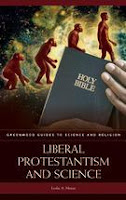 FROM LESLIE MURAY: My new book, Liberal Protestantism and Science, is part of a textbook series on religion and science published by Greenwood Press. The basic premise of the book is that, contrary to the conventional stereotype, there is a trajectory within the Christian tradition—namely, Liberal Protestantism—that has radically, enthusiastically, and unequivocally embraced science, including the theory of evolution (and the secularity that comes with it).
FROM LESLIE MURAY: My new book, Liberal Protestantism and Science, is part of a textbook series on religion and science published by Greenwood Press. The basic premise of the book is that, contrary to the conventional stereotype, there is a trajectory within the Christian tradition—namely, Liberal Protestantism—that has radically, enthusiastically, and unequivocally embraced science, including the theory of evolution (and the secularity that comes with it).The book tells the story of Liberal Protestantism, tracing it back to the Enlightenment (with its belief that reason is the defining characteristic of being human and a willingness to question all authority), as well as to Romanticism (which saw feelings and emotions as defining human characteristics). From there, the book explores Liberal Protestantism’s embrace of modern science, including Darwinism (and Social Darwinism) in the 19th century, and later, the emergence of theologies of secularization, including the “death of God” movement. Also included: the beginnings of the movement to integrate science and religion, as seen in the journal Zygon and groups such as the Institute of Religion in an Age of Science, the Center for Theology and the Natural Sciences, and other organizations affiliated with the Templeton Foundation like the Metanexus Institute. The final sections consider process theology and ecotheology as the frontier of the dialogue between religion and science. And throughout the book, epistemological issues, which provide perhaps the greatest source of division between religion and science, are addressed.

No comments:
Post a Comment
Note: Only a member of this blog may post a comment.